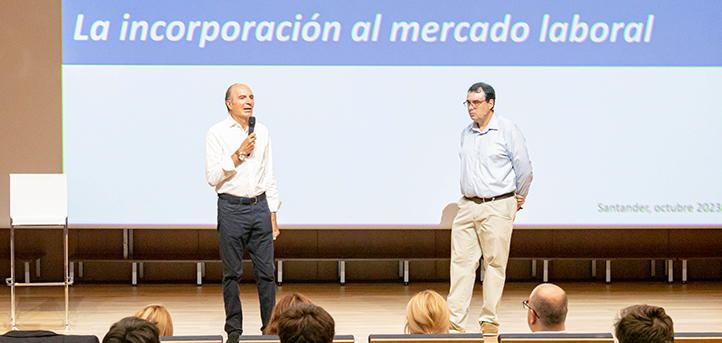The Universidad Europea del Atlántico (European University of the Atlantic) (UNEATLANTICO) has relaunched its program ¿Y ahora qué? (Now What?) for the 23/24 academic year. This series of conferences invites top professionals from major global companies to discuss employment opportunities and provide career advice based on their vast experience and the current state of the business world.
The inaugural session of this series took place in the University’s Assembly Hall and was led by computer engineer Carlos Luzuriaga Ortiz. The guest speaker has almost a decade of experience as a CEO and consultant in the United States. He began his journey with NTT Data «leading Japanese IT services company that ranks among the top 10 worldwide, boasts over 140,000 professionals, and operates in more than 50 countries» previously known as Everis, a firm he has been a partner at since 2015.
Additionally, after serving as the account manager for BBVA in North America, Luzuriaga currently collaborates with various United Nations (UN) agencies, including the United Nations Children’s Fund (UNICEF) and the United Nations Development Program (UNDP). He also works with the Development Bank of Latin America and the Caribbean (CAF) and the Inter-American Development Bank (IDB). Given his vast professional experience, he offered students valuable advice on job hunting, crafting resumes, conducting oneself in interviews, and navigating the initial days in a new job position.
The current labor market and the new worker profile according to Carlos Luzuriaga
Carlos emphasized the evolving nature of today’s job market, noting its digital transformation where information is paramount and basic tasks are automated using technologies like RPA and AI. He also highlighted its global nature, characterized by interconnected environments and diverse teams.
Additionally, he outlined the desired skill set for modern workers, which includes digital proficiency, effective communication, continuous learning, time management, global understanding, and a strong sense of ethics and responsibility. Therefore, he stressed: «Knowledge is a necessary but not sufficient condition. It is necessary to develop a series of competencies that enable differentiation and better adaptation to this new labor market».
Francisco Zuzunegui, director of the SITE/UNEATLANTICO and Mentor Palanca Talento and People Cantabria 2030 from CEOE-CEPYME Cantabria, moderated the presentation. During the Q&A session, he provided students with practical tips to better navigate their entry into the job market.


